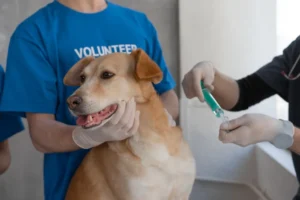We’ve all been there: you bring your furry friend to the vet for their regular vaccinations, and you can’t help but feel a little anxious about the potential side effects.
It’s normal for you to be concerned about how your beloved pets will react to these necessary shots.
In this article, we’ll address those concerns head-on by exploring common vaccine side effects in dogs, how to manage them, and when it’s time to seek professional help.
With this helpful guide in hand, you’ll be equipped to navigate the post-vaccine world with confidence, ensuring that your canine companion stays happy, healthy, and wagging their tail every step of the way. So, let’s dive in and turn that worried frown upside down!

Common Side Effects of Vaccinations
While vaccinations are crucial for your dog’s health (whether core or non-core), it’s also important to stay informed about the potential side effects to ensure your dog’s comfort and safety.
Like humans, dogs can experience some side effects after receiving their shots. However, these reactions are generally mild and manageable.
In this section, we’ll discuss common side effects of vaccinations in dogs, categorized by their severity, and provide you with some useful recommendations to help your furry friend bounce back quickly.
Mild Reactions
Mild side effects are the most common reactions your dog may experience after a vaccination. These typically occur within a few hours to a day after the shot and may include:
- Slight swelling or tenderness at the injection site
- Mild fever
- Lethargy or fatigue
- Reduced appetite
To help your dog feel more comfortable, you can apply a cold compress to the injection site to reduce swelling and provide extra cuddles and reassurance to help them rest. Keep an eye on your dog’s energy levels and appetite, as they should return to normal within a day or two.
Moderate Reactions
Although less common, moderate reactions can also occur after vaccinations. These may include:
- Diarrhea or vomiting
- Hives or skin rash
- Swelling of the face, neck, or limbs
For diarrhea and vomiting, ensure your dog stays hydrated by providing fresh water and offering a bland diet, such as boiled chicken and rice, for a day or two.
If your dog develops hives or a rash, you can try an over-the-counter antihistamine, but consult your vet for the correct dosage.
Our dog’s reaction:
Remember, it’s vital to monitor your dog closely during this time and consult your veterinarian if the symptoms worsen or persist for more than a couple of days.
How to Manage Vaccine Side Effects
Managing vaccine side effects helps to ensure your dog’s comfort and quick recovery. Here are some practical tips to help your canine companion through the post-vaccination period.
Provide a Comfortable Environment
Your dog may feel more tired or lethargic after receiving vaccinations. Make sure they have a comfortable and quiet space to rest, away from any loud noises or disturbances. Soft bedding and a favorite toy can provide additional comfort.
Encourage Hydration
Drinking water is essential for dogs recovering from vaccinations, especially if they’re experiencing vomiting or diarrhea. Keep fresh water available at all times and encourage your dog to drink by placing the water bowl close to their resting spot.
Monitor Temperature and Symptoms
Use a pet-safe thermometer to check your dog’s temperature if you suspect they have a fever. A normal temperature for dogs is between 101 and 102.5 degrees Fahrenheit (38.3 to 39.2 degrees Celsius).
If your dog’s temperature is above this range, or if their symptoms worsen, contact your veterinarian for guidance.
Offer a Bland Diet
If your dog has an upset stomach, consider feeding them a bland diet for a day or two. Boiled chicken and rice, or a specialized prescription diet recommended by your veterinarian, can be gentle on their stomach and help them recover more quickly.
Provide Gentle Exercise
While it’s essential to let your dog rest after vaccinations, some gentle exercise can help them feel better. Short, leisurely walks or low-key playtime can help your dog regain their energy levels and prevent boredom.
Check the Injection Site
Inspect the injection site daily for any signs of infection, such as redness, swelling, or discharge. If you notice any of these symptoms, consult your veterinarian.
Stay in Touch with Your Veterinarian
Your vet is your best ally when it comes to managing vaccine side effects. Don’t hesitate to reach out with questions or concerns, and always consult your vet before administering any medications to your dog.
When to Consult Your Veterinarian
While most vaccine side effects in dogs are mild and manageable, you should know when to seek professional advice. In this section, we’ll discuss the specific circumstances that warrant a visit or call to your veterinarian.
Signs of Severe Reactions
Severe reactions, though rare, require immediate attention from a veterinarian. Some signs to look out for include:
- Persistent vomiting or diarrhea lasting more than 24 hours
- Difficulty breathing or excessive coughing
- Collapse or loss of consciousness
- Seizures
- Swelling that doesn’t improve with over-the-counter antihistamines
- High fever (above 103 degrees Fahrenheit or 39.4 degrees Celsius)
If you notice any of these symptoms in your dog, contact your veterinarian or an emergency animal clinic as soon as possible.
Dealing With Allergic Reactions
Allergic reactions can vary in severity, and some may necessitate a visit to the vet. Indications that your dog is experiencing an allergic reaction include:
- Swelling of the face, ears, or muzzle
- Hives or rashes
- Persistent itching or scratching
- Excessive drooling or difficulty swallowing
If your dog exhibits mild swelling or hives, try an over-the-counter antihistamine (with your vet’s guidance on dosage). However, if the reaction is more severe or doesn’t improve with medication, consult your veterinarian immediately.
Trust Your Instincts
The truth is, you know your pet better than anyone else. If you’re concerned about your dog’s behavior, health, or response to a vaccination, don’t hesitate to reach out to your veterinarian.
It’s better to be cautious and seek professional advice than to take risks when it comes to your dog’s well-being.
By being aware of these signs and knowing when to consult your veterinarian, you can help ensure your dog’s safety and health after vaccinations. Remember, your vet is your partner in your dog’s care, and they’re always there to help you with any concerns or challenges that may arise.
For more information on caring for your dog, check the dog health & care category of our posts, or use the tags below (in orange) to narrow your search of our site.
FAQs
Alex, a passionate animal lover, has experience in training and understanding animal behavior. As a proud pet parent to two dogs and three cats, he founded AnimalReport.net to share insights from animal experts and expand his knowledge of the animal kingdom.









